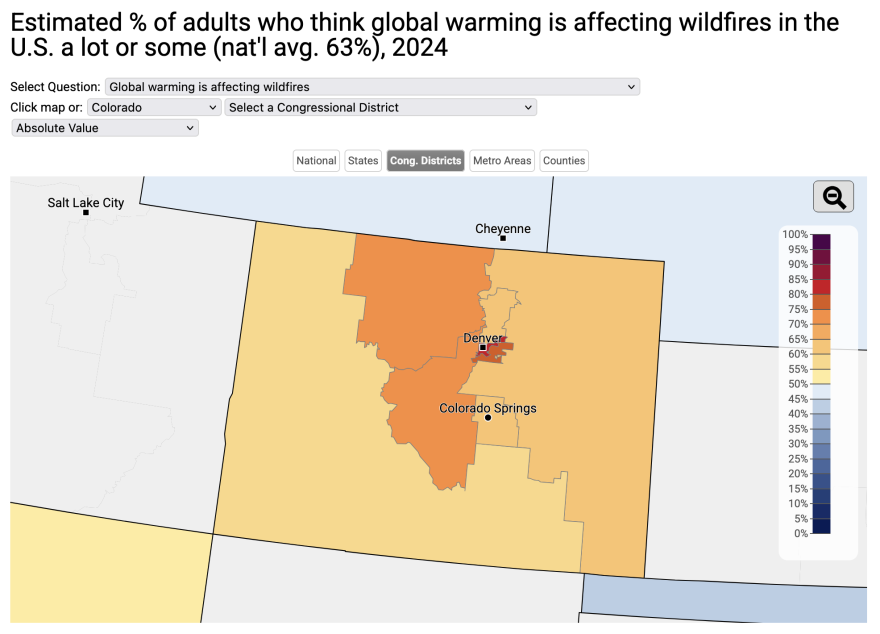The majority of Americans are linking human-caused climate change with weather, including extreme events like wildfires, droughts, and floods. That's according to new data from Yale University's Program on Climate Change Communication.
Yale has surveyed the American public for its opinions on climate change and global warming (terms it uses interchangeably) for seventeen years, though 2024 was the first year it asked respondents specific questions about global warming and specific phenomena, like wildfire. It found that over 60% of Americans think climate change is impacting extreme heat, wildfires, and drought. Over 50% of Americans think it's affecting hurricanes, flooding, and rising sea levels.
Jennifer Marlon, a senior research scientist at Yale's School of the Environment, said there are certain concepts that are more intuitive for the general public to understand; it's not surprising that people make a connection between extreme heat and global warming (64% of respondents say they're connected).
But she was surprised by the number of Americans that connected climate change to wildfire behavior—63% nationwide.
"I didn't know that people really understood that that's true," she said. "There's good evidence that global warming is causing wildfires in general to become more uncontrollable, larger, and in many cases, more severe. But the majority of Americans are understanding that."
Conversely, Marlon was surprised that fewer respondents — 58% — linked global warming to sea level rise.
"Sea levels are absolutely rising and there's no scientific debate about that," she said. "It's rising because global temperatures are rising, and when you heat the planet's water, what happens to water when you heat it up? Well, it expands. And so the oceans are actually expanding, and that's causing sea levels to rise."

Sharp divides in the Mountain West
"There might be some of the strongest contrasts in the Rocky Mountains than in anywhere else (in) the U.S.," Marlon said.
70% of Coloradans say they think global warming is affecting wildfires, compared to 60% of Utahns and 48% of Wyomingites — with similar numbers for extreme heat and drought.
The survey's data goes further than just state level data, and the online map tool allows viewers to view specific congressional districts, or counties and metro areas. Marlon said that breakdown makes the divisions even starker.
"As you move from some of the counties in Central Colorado up into Wyoming, you go from things like: 60% of residents in Park County (Front Range southwest of Denver) think that global warming is affecting flooding, to 33% of the residents in Sweetwater County, Wyoming (southwest Wyoming, bordering Colorado and Utah), who think the same thing. So really strong contrasts there."
Marlon said there are a few factors that contribute to these divides. Colorado's numbers are likely so high for questions about wildfire because of the state's history.
"Colorado has seen a lot of fire activity, some really deadly fires, destructive fires," she said. "While, of course, there have always been fires in Colorado, the experience is changing there a bit."
All of the state's four largest fires have occurred in the last five years, including this summer's Lee Fire in Rio Blanco County, and all of the state's five most destructive fires have happened in the last fifteen years, including the Marshall Fire in 2021.
But Coloradans also, by-and-large, link climate change with other phenomena, like drought and flooding. Marlon said other factors include an urban-rural divide, something visible in the county-by-county breakdown, and partisan politics and news consumption also likely play a role, according to Marlon.

In Colorado's 3rd Congressional District, which leans reliably Republican, 58% of adults said they thought climate change was affecting wildfire, compared with 82% of the 1st District, which encompasses the very solidly Democratic Denver.
"If you're hearing about the environment and the worsening, air pollution, and problems with clean water and all of that, and you're hearing about climate change and environmental degradation every day when you look at the news, you start to develop these beliefs and concerns about our natural resources," Marlon said. "And then what your local leaders say about these issues has a really important effect as well on public opinion at these local scales."
Yale's data has some similarities to other surveys that have collected data on opinions about climate change in the West.
For example, 66% of Coloradans in Yale's survey say they're worried about global warming. That aligns with Colorado College's Conservation in the West poll, which had 64% of Coloradans say they think climate change is an extremely or very serious problem. For Utah, Yale has the number at 59% and Colorado College has it at 47%, and in Wyoming, Yale shows 48% and Colorado College has it at 36%.
Overall, Marlon said this data tells her and her fellow researchers that Americans are paying attention to the weather, and they're seeing severe weather events occur in real time.
"Yes, we have always had wildfires and hurricanes and floods, but they've never been amped up to the degree that they are now," she said. "They've never been this severe, and they've never been this costly."
"It's telling us that people are starting to not only understand what climate change means from a scientific standpoint, or just a conceptual, abstract standpoint, but they're really experiencing it now on the ground," she said.
Copyright 2025 Rocky Mountain Community Radio. This story was shared via Rocky Mountain Community Radio, a network of public media stations in Colorado, Wyoming, Utah, and New Mexico, including KDNK.


